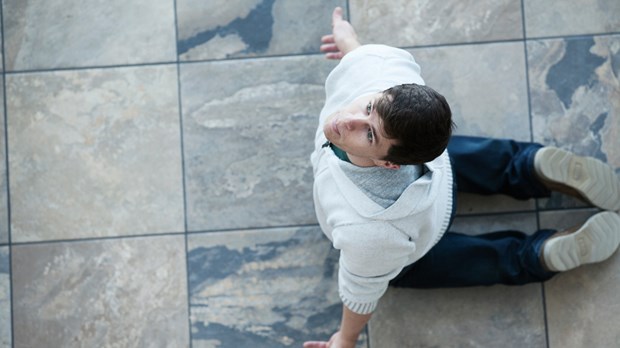The Body Language of Prayer

For most of my life, I have prayed lying down: late-night thoughts directed at God from my pillow. It probably comes as little surprise that, for most of my life, I have ended up asleep shortly after. Feeling betrayed by my body, I could not pray.
Several years ago a coworker at our church staff prayer meeting caught my attention when he arranged his body differently than the rest of us during prayer. He sat with head bowed, as we all did, but he extended his hands on the table, palms upward. I asked him afterward why he kept his hands outstretched. “It’s to remind me of the ‘nothing in my hands I bring’ thing,” he said, “and that I’m open to receiving whatever God has for me.”
I had long known that prayer is talking to God, communicating with the divine using human language. However, the thought that prayer might involve body language was a new one. But why not? Experts tell us that most of our communication is nonverbal, with intonation and body language accounting for more than 75 percent of the messages received by hearers. Crossed arms indicate defensiveness; hands on hips, aggression. Leaning forward and maintaining eye contact while listening indicate attentiveness and interest.
Experiments in Prayer Posture
With this new thought in mind, I became self-conscious about my supine supplications. What did my posture communicate about my priorities in prayer? Yes, it showed a trust that God is intimate and omniscient—knowing every thought before it is on my tongue and loving me even in the ragged exhaustion of the last moments of my day. But was it also possible that my pillow prayers indicated little commitment to God? After all, a healthy marriage needs more than a hastily whispered goodnight in its communication repertoire.
So I began to make a point of sitting up to pray, with palms extended as my friend had shown me. Before long I didn’t want to pray in bed anymore. I moved to the dining table. I found the shape of my prayers shifting with my posture. I prayed more intently; my thoughts drifted less. I found myself needing to pray some things out loud and even—on occasion—in writing. There were times when I felt the need to raise my hands, pushing back the awkward self-consciousness of wondering exactly what kind of weirdness my worship signals might communicate.
Phrases I had previously skimmed over in Scripture began to leap to my attention: places where men are commanded not just to pray but to do so “lifting holy hands” (1 Timothy 2:8), where we are told not just to worship God but to “bow down” before our Lord and maker (Psalm 95:6). The prophets of old “fell on their faces” before the Lord (Number 16:22), and Jesus himself “knelt down” to pray (Luke 22:41).
The Spirit-Body Connection
Tim Challies astutely observes that God is more concerned with the content of our prayers than the posture of our prayers. However, he says that “there can be no doubt that our bodies can be an expression of our hearts.”
Our body posture involves more than the spiritual expression of our hearts, though. Authors James K. A. Smith and Tara Owens are convinced that our bodies play a crucial role in our spiritual formation too. What we do with our bodies not only expresses but also shapes our loves and convictions.
An old cartoon suggests that if phrenology (the debunked 19th century pseudoscience of discerning people’s skills by feeling the shape of their skulls) were true, then one could alter a person’s abilities by changing her skull shape. While that’s obviously not true, when it comes to our bodies and prayer, there is a real, not imagined, feedback loop between the two. For we humans are not just saved souls and enlightened minds: We are embodied souls.
In his books Desiring the Kingdom and Imagining the Kingdom, Smith makes the case that Christians cannot think their way into the Kingdom. Christian discipleship is not so much a question of spiritual information as spiritual formation: learning to love what God loves. “Behavior is not driven by ideas,” David Neff writes in his CT interview of Smith. “It is a bodily thing that reflects the way we order—or disorder—our loves and desires.”
Central to our practice of this aspect of our discipleship is awareness of the ways in which our senses fuel our imaginations and cultivate desires in us—desires which in turn fuel our loves and our leanings. The adrenaline rush and camaraderie of cheering for Monday Night Football (or the thrill of being at the mall) do more than provide entertainment: They stimulate the neural cortices firing in our brains and flooding our pleasure sensors in a way that makes us want more football.
Taking Our Bodies Seriously
Part of our discipleship, then, must be choosing bodily habits and practices that orient our loves toward God. There is a reason, after all, that the two practices Jesus commanded his disciples to keep were embodied ones: the crunch-and-swallow of the Lord’s Supper and the undeniably wet experience of baptism. Rachel Held Evans’s Searching for Sunday, arranged around the seven sacraments, is a recent testimony to how the physical sacraments became a lifeline and means of grace to a doubting Millennial. In a season where words of doubt flooded her mind, she writes of the anchoring grace of receiving the gospel with her body, within the greater church body.
While Held Evans and Smith write about the grace of corporate worship, Owens is passionate about believers learning about corporeal worship in their personal devotions too. In Embracing the Body: Finding God in Flesh and Bone, Owens contends that our bodies teach us about God and that God communicates to us through our bodies. Tragically, Owens says in her book, most of us live without any awareness that our spirituality is intimately tied to our physicality:
We suppress—and repress—every desire we have to be touched, every noticing we have of our physical body and the urges that we experience in it. Some of us end up in accountability groups, trying desperately to pretend that we don’t have any desires or, if we do, that we need to confess them and repent of feeling any physical desires, any embodied longing. We’re practical Gnostics. While we confess with our mouths that we believe Christ became human, we live as if the stuff of this world can’t be redeemed, or, worse, is actively working against holiness.
Owens’s words make me realize that, like Wormwood’s novice patient in C. S. Lewis’s The Screwtape Letters, I have fallen prey to an ancient deceit. We too easily believe (and thus live and pray) as if our bodies were irrelevant to our spiritual well-being. In his diabolical advice to his nephew, Screwtape writes: “At the very least, they can be persuaded that the bodily position makes no difference to their prayers; for they constantly forget, what you must always remember, that they are animals and that whatever their bodies do affects their souls.”
Owens calls us, as Augustine and other sages through the ages have done, to remember our “animal nature” and revisit our latent Gnosticism. Our good bodies were created by our good God, and it is his intention that we live in physical bodies for the rest of eternity, just as Jesus will. We should, therefore, pay attention to what our bodies tell us about God, ourselves, and the world.
Owens calls us to cultivate an awareness of our bodies: learning to listen to their weaknesses and wants. Our hungers for rest, connection, and beauty are more than primal urges that should be suppressed but are in fact divine sensors calling us to live life abundantly, embodied.
Choosing to Embody Devotion
Perhaps, then, my urge to nap should not be stifled with coffee but satiated with sleep. Perhaps my body is preaching that there is a good Creator who calls me to rest, if only I would listen.
And perhaps, if I am serious about offering my body as a living sacrifice, as Romans 12:1 enjoins, I should not lie down on a pillow and expect something more than a brief, soporific prayer.
If our union with Christ is reflected in our unions in marriage, I would do well to take the words of the ancient marital vows to heart in my commitment to God: With my body, I thee worship.
Bronwyn Lea is a South African-born writer and speaker living in California with her husband and three littles. She likes puns, novels, ice-cream recipes, and lately, praying outside. Find her on Facebook or Twitter at @bronleatweets.
Read more articles that highlight writing by Christian women at ChristianityToday.com/Women
 Read These Next
Read These Next



 If God Is Just, Why All This Suffering?Holding God's goodness and the world's pain in tension
If God Is Just, Why All This Suffering?Holding God's goodness and the world's pain in tension









 Homepage
Homepage